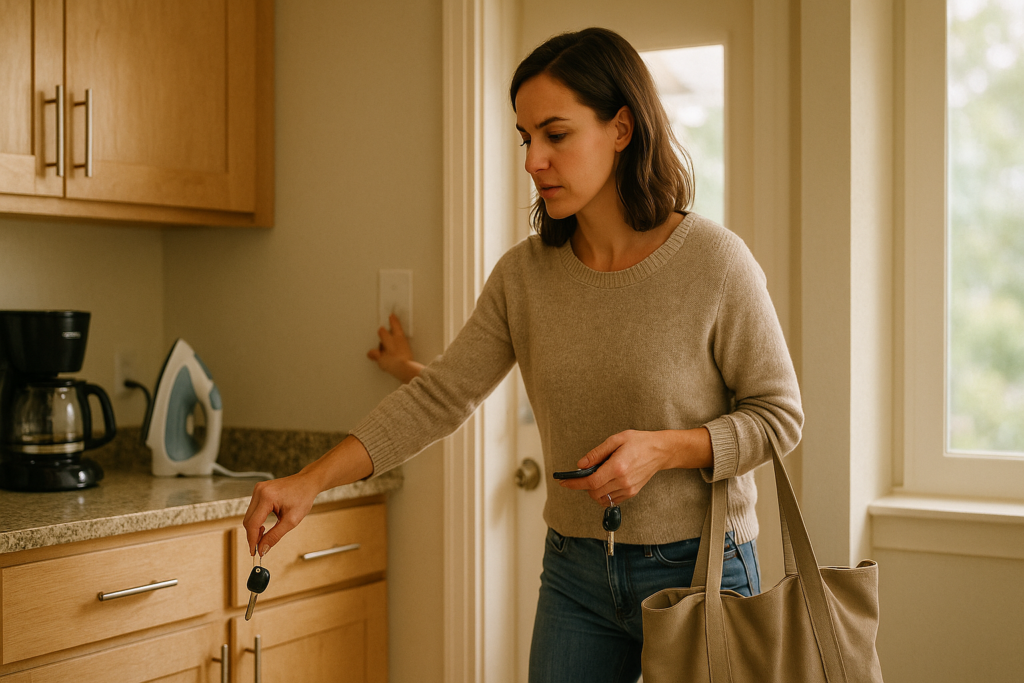We’ve all seen them—or we are them.
The people who, before stepping out the door, run back to check the stove. Again. They touch the doorknob twice. They scan each room for signs of danger, like a kettle left plugged in or a fan whirring on low. They double-check windows, switches, sockets—even things that were never on in the first place.
It might seem quirky. Maybe even obsessive. But beneath this seemingly mundane ritual lies a fascinating psychological profile.
People who feel the need to double-check everything before leaving the house often share a unique blend of emotional sensitivity, conscientiousness, and cognitive wiring that shapes how they see the world.
Here are 7 subtle personality traits they typically display.
1. They’re deeply conscientious
At the core, this behavior often stems from conscientiousness—a Big Five personality trait associated with responsibility, orderliness, and self-discipline.
People high in conscientiousness like to do things properly. They value systems, structure, and predictability. Leaving the house without checking things feels… incomplete. It’s like walking out with your shoelaces untied—something’s off.
For these individuals, double-checking isn’t a compulsion. It’s a commitment to doing things right, every time.
2. They carry a strong sense of personal responsibility
If the house burns down, it’ll be their fault. If the cat escapes through an open window, it’s on them. This deep-rooted sense of accountability can be both a strength and a burden.
People who double-check everything often imagine worst-case scenarios—not because they’re pessimistic, but because they feel it’s their job to prevent them.
It’s an internalized belief that “If I don’t check, something bad will happen—and I’ll be the reason why.”
This trait shows up in other areas of life too. They’re the ones who volunteer to drive because they don’t trust others to stay alert. Or the ones who review work projects line-by-line before submission—just in case.
3. They tend to be highly sensitive to consequences
These individuals live with a heightened awareness of cause and effect.
- If I leave the iron on, the curtains could catch fire.
- If I forget to lock the door, someone could break in.
- If I don’t unplug the toaster, it might start a fire while I’m gone.
While most people brush off these thoughts, the double-checker doesn’t. Their brain grabs onto the scenario and runs with it. And the only way to quiet that mental noise?
Check. Again.
This isn’t always about anxiety—it’s often about risk assessment. They weigh the consequences of a small oversight as disproportionately large, because they’ve seen (or imagined) what could happen.
4. They quietly carry anxiety, even if they don’t show it
Not all double-checkers are openly anxious. Some are calm, composed, and outwardly laid-back. But beneath that surface, their minds are always on.
Double-checking is often a way to self-soothe. It’s a ritual that provides control in a world full of uncertainty.
They might not pace or panic—but they do worry. And they channel that worry into small, manageable actions. It gives them a sense of control over the unpredictable.
This kind of “functional anxiety” is subtle. It doesn’t always stop them from living fully—but it does mean they carry a constant mental checklist wherever they go.
5. They’ve likely had a past experience that left an emotional imprint
You’ll often find that these individuals had an early experience that reinforced the importance of checking.
Maybe:
- The family home almost caught fire once.
- Someone left a door unlocked and there was a robbery.
- They forgot something as a child and were harshly scolded.
It doesn’t have to be dramatic. It just needs to be emotionally sticky—a moment where they learned that not checking leads to bad outcomes.
From then on, their brain logs “checking” as a necessary safety behavior. Even if the original event happened decades ago, the emotional imprint remains.
6. They often excel in detail-oriented environments
You’ll find these individuals thriving in jobs that require accuracy, diligence, or methodical thinking—accountants, editors, engineers, project managers.
Their need to double-check at home often reflects how they operate professionally. They don’t “eyeball” things. They proofread. They ask follow-up questions. They check the fine print.
This attentiveness to detail is a huge strength—but it can also make them feel like they’re never quite finished. There’s always one more thing to verify. One more box to tick.
7. They care deeply—even if they downplay it
At the heart of it, double-checkers are people who care. About safety. About outcomes. About doing things properly.
They might make jokes about their habits, calling themselves neurotic or overly cautious. But underneath that self-deprecation is someone who wants to protect what matters—whether it’s their home, their loved ones, or their peace of mind.
They don’t double-check because they’re silly. They double-check because it matters to them. And because leaving the house with a settled mind is worth a few extra seconds.
What it all means
If you—or someone you know—routinely double-checks every appliance, door, and plug socket before leaving the house, it’s not just a quirk. It’s a behavioral expression of deeper personality traits:
- A commitment to thoroughness
- A high sense of responsibility
- A strong need for security
- And often, a mind wired to spot potential threats and neutralize them
Far from being a flaw, these habits reveal layers of thoughtfulness and care that many people overlook.
A final word
In a world that often values speed over caution and casualness over care, double-checkers are the quiet sentinels—making sure the lights are off, the doors are locked, and the small stuff is handled.
Their minds may be busy. Their habits may seem extreme. But their intention is always this:
“I just want to be sure. So I can go about my day in peace.”
And there’s something quietly beautiful about that.







